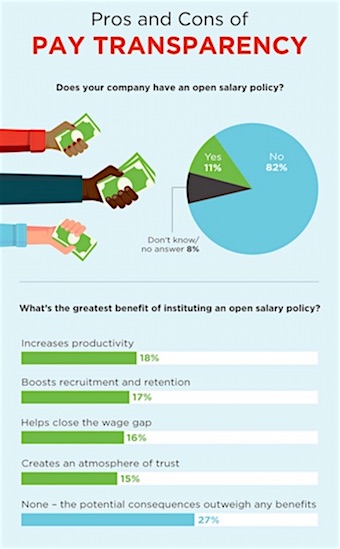Executives working in the advertising and marketing industries widely oppose the idea of enacting an open salary policy at their place of employment, according to a recent survey published by staffing and recruiting agency The Creative Group.
A growing trend in the workforce for the last several years, the open salary concept is one in which everyone within a company knows what everyone else is earning. Proponents of this practice say that sharing employee compensation details squashes rumors and instills a culture of trust and transparency in the workplace, which can produce a more equitable, ethical work environment and may also help eliminate wage discrimination against women and minority employees.
 |
A common practice among government entities for years, open salary policies are now being adopted by an increasing number of companies within the private sector, perhaps due to the influence of the Internet, which has normalized company earnings and salary information disclosure. Austin-based grocer Whole Foods is one such company that has employed an open salary practice since its inception. The concept is also especially popular among tech start-ups in Silicon Valley.
The disadvantages of such a practice are what one might expect: for employees, the prospect of comparing paychecks is uncomfortable; moreover, such a policy may also reveal a company’s disparate salary structure, which can lead to lower employee retention and may also hurt staff morale.
Professionals working in the advertising and marketing industries appear to agree with the latter sentiment. More than half of respondents — 61 percent — in the Creative Group study said they believe an open salary policy would have a negative effect on employee confidence.
More than seven in 10 advertising executives — or 72 percent — stationed at agencies staffing at least 100 employees believe such a policy would have an adverse effect at their company.
Many ad and marketing executives see the potential benefits of an open salary policy, however: according to the survey, 18 percent said they think such a concept could boost staff productivity, and others —17 percent — said these policies may help improve staff recruitment and retention. Others also believe it could instill trust and help close an existing wage gap. Still, more than a quarter of ad and marketing executives — 27 percent — also said they believe the potential consequences outweigh any benefits these policies might have.
The study shows that currently, the open salary concept is also not a practice widely adopted by the communications industry. A clear majority of advertising and marketing executives surveyed — 82 percent — said their company does not presently have a pay transparency policy in place. The study also found that open salary policies were most prevalent at midsize companies and least common at large agencies.
The Creative Group survey, which was conducted by research firm SSRS, interviewed more than 400 professionals comprised of roughly 200 marketing executives from companies with 100 or more employees, and 200 advertising executives from agencies with 20 or more employees.
The Creative Group is a division of professional staffing service Robert Half.


 Abandon traditional content plans focused on a linear buyer progression and instead embrace a consumer journey where no matter which direction they travel, they get what they need, stressed marketing pro Ashley Faus during O'Dwyer's webinar Apr. 2.
Abandon traditional content plans focused on a linear buyer progression and instead embrace a consumer journey where no matter which direction they travel, they get what they need, stressed marketing pro Ashley Faus during O'Dwyer's webinar Apr. 2. Freelance marketers and the companies that hire them are both satisfied with the current work arrangements they have and anticipate the volume of freelance opportunities to increase in the future, according to new data on the growing freelance marketing economy.
Freelance marketers and the companies that hire them are both satisfied with the current work arrangements they have and anticipate the volume of freelance opportunities to increase in the future, according to new data on the growing freelance marketing economy. Home Depot's new attempt to occupy two market positions at once will require careful positioning strategy and execution to make it work.
Home Depot's new attempt to occupy two market positions at once will require careful positioning strategy and execution to make it work. Verizon snags Peloton Interactive chief marketing officer Leslie Berland as its new CMO, effective Jan. 9. Berland succeeds Diego Scotti, who left Verizon earlier this year.
Verizon snags Peloton Interactive chief marketing officer Leslie Berland as its new CMO, effective Jan. 9. Berland succeeds Diego Scotti, who left Verizon earlier this year.  Norm de Greve, who has been CMO at CVS Health since 2015, is taking the top marketing job at General Motors, effective July 31.
Norm de Greve, who has been CMO at CVS Health since 2015, is taking the top marketing job at General Motors, effective July 31.


 Have a comment? Send it to
Have a comment? Send it to 
No comments have been submitted for this story yet.